Filter by
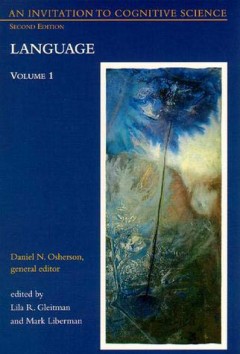
An Invitation to Cognitive Science, Volume 1 : Language
An Invitation to Cognitive Science provides a point of entry into the vast realm of cognitive science, offering selected examples of issues and theories from many of its subfields. All of the volumes in the second edition contain substantially revised and as well as entirely new chapters. Rather than surveying theories and data in the manner characteristic of many introductory textbooks in t…
- Edition
- -
- ISBN/ISSN
- 9780262273916
- Collation
- -
- Series Title
- -
- Call Number
- 153 INV
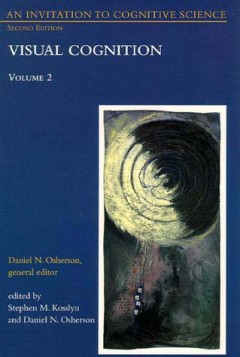
An invitation to cognitive science Volume 2 : Visual Cognition
An Invitation to Cognitive Science provides a point of entry into the vast realm of cognitive science, offering selected examples of issues and theories from many of its subfields. All of the volumes in the second edition contain substantially revised and as well as entirely new chapters.Rather than surveying theories and data in the manner characteristic of many introductory textbooks in the f…
- Edition
- Edisi kedua
- ISBN/ISSN
- 0585053758
- Collation
- 1 online resource : illustrations
- Series Title
- -
- Call Number
- 153 INV
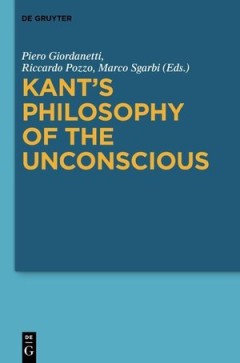
Kant's Philosophy of the Unconscious
In the 20th century, the role of the unconscious in Kant`s philosophy has been in great part neglected by Kant scholars. Nevertheless, the unconscious, the other of consciousness, is a key problem of the critical philosophy. The purpose of the volume is to fill a substantial gap in Kant research and to offer a complete survey of the topic in different areas of research, such as history of philo…
- Edition
- -
- ISBN/ISSN
- 9783110204032
- Collation
- 330 halaman
- Series Title
- -
- Call Number
- 100 KAN
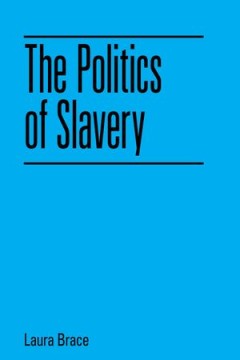
The Politics of Slavery
Looking at scholarship on both ‘old’ and ‘new’ slavery, Laura Brace assesses the work of Aristotle, Locke, Hegel, Kant, Wollstonecraft and Mill, and explores the contemporary concerns of human trafficking and the prison industrial complex to consider the limitations of ‘new slavery’ discourse.
- Edition
- -
- ISBN/ISSN
- 9781474401142
- Collation
- 240 halaman
- Series Title
- -
- Call Number
- 100 BRA p
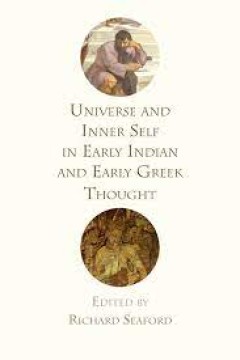
Universe and Inner Self in Early Indian and Early Greek Thought
From the sixth century BCE onwards there occurred a revolution in thought, with novel ideas such as such as that understanding the inner self is both vital for human well-being and central to understanding the universe. This intellectual transformation is sometimes called the beginning of philosophy. And it occurred – independently it seems - in both India and Greece, but not in the vast…
- Edition
- -
- ISBN/ISSN
- 9781474411004
- Collation
- 320
- Series Title
- -
- Call Number
- 100 UNI
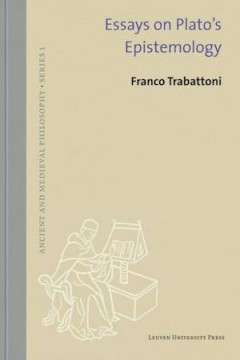
Essays on Plato’s Epistemology
Through a careful survey of several significant Platonic texts, mainly focussing on the nature of knowledge, Essays on Plato's Epistemology offers the reader a fresh and promising approach to Plato's philosophy as a whole. From the very earliest reception of Plato's philosophy, there has been a conflict between a dogmatic and a sceptical interpretation of his work and thou…
- Edition
- -
- ISBN/ISSN
- 9789462700598
- Collation
- 336 halaman
- Series Title
- Ancient and Medieval Philosophy - Series 1
- Call Number
- 100 TRA e
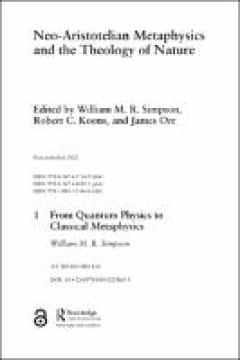
Chapter 1 from Quantum Physics to Classical Metaphysics
"In this chapter, I argue that Aristotle's doctrine of hylomorphism, which con- ceived the natural world as consisting of substances which are metaphysically composed of matter and form, is ripe for rehabilitation in the light of quantum physics. I begin by discussing Aristotle's conception of matter and form, as it was understood by Aquinas, and how Aristotle's doctrine of hylomorphism wa…
- Edition
- -
- ISBN/ISSN
- 9780367637149
- Collation
- Pages 46
- Series Title
- -
- Call Number
- 100 SIM c

Thinking and Killing : Philosophical Discourse in the Shadow of the Third Reich
This book explores the phenomenon of the Third Reich from a philosophical perspective. It concentrates on the ways in which the subjects and experiences of Nazi Germany, the Holocaust and Anti-Semitism are conceived by eight German thinkers from the Continental tradition. This title was made Open Access by libraries from around the world through Knowledge Unlatched.
- Edition
- -
- ISBN/ISSN
- 9781614511021
- Collation
- 116 halaman
- Series Title
- -
- Call Number
- 100 SEG t
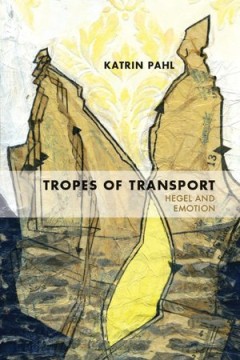
Tropes of Transport : Hegel and Emotion
Intervening in the multidisciplinary debate on emotion, Tropes of Transport offers a fresh analysis of Hegel’s work that becomes an important resource for Pahl’s cutting-edge theory of emotionality. If it is usually assumed that the sincerity of emotions and the force of affects depend on their immediacy, Pahl explores to what extent mediation—and therefore a certain degree…
- Edition
- -
- ISBN/ISSN
- 9780810127852
- Collation
- 296 halaman
- Series Title
- -
- Call Number
- 100 PAH t
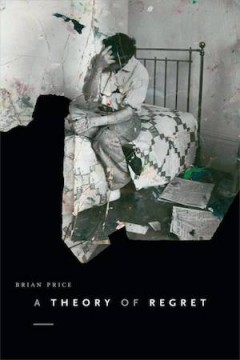
A Theory of Regret
In A THEORY OF REGRET Brian Price takes up regret as a useful political emotion and, surprisingly, as a way to understand bureaucracy. Drawing on the work of Hannah Arendt, Aristotle, and Heidegger, as well as examples from film, Price presents a philosophical reflection on the transformative qualities of regret insofar as it provides opportunities to re-evaluate our commitments and to recogniz…
- Edition
- -
- ISBN/ISSN
- 9780822369363
- Collation
- 176 halaman
- Series Title
- -
- Call Number
- 100 PRI t
 Computer Science, Information & General Works
Computer Science, Information & General Works  Philosophy & Psychology
Philosophy & Psychology  Religion
Religion  Social Sciences
Social Sciences  Language
Language  Pure Science
Pure Science  Applied Sciences
Applied Sciences  Art & Recreation
Art & Recreation  Literature
Literature  History & Geography
History & Geography